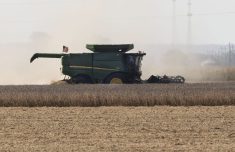Samples taken from meat processed at the XL Food’s plant in Brooks, Alta., have tested negative for E. coli, but there are no plans to reopen the plant, said the Canadian Food Inspection Agency today.
CFIA spokesperson Paul Mayer said the agency plans to spend the weekend reviewing its observations of the deboning and cutting activities, specific E. coli controls, meat hygiene, sampling techniques and overall sanitation to decide the next step for the beleaguered meat plant at the centre of a massive beef recall.
“We know that everyone is eager to have this work completed and we are certainly moving ahead as quickly as possible, but we must remain focused on the need to protect consumers,” said Mayer, during a news conference Oct. 19.
Read Also

Alberta harvest wrapping up: report
Harvest operations advanced to 96 per cent complete in Alberta as of Oct. 7, with only a few late-seeded cereal and canola fields remaining, according to the latest provincial crop report.
“The Canadian Food Inspection Agency’s top priority is consumer safety so this facility’s operating licence will not be returned until we are completely satisfied that this plant can produce safe food,” he said.
More than 1,800 beef products originating from Brooks have been recalled from retailers across Canada and the United States since the CFIA temporarily suspended its licence in September.
The Public Health Agency of Canada said one more case of E. coli poisoning linked to the plant brings the total to 16.
CFIA officials said they are waiting for answers from XL Foods officials of what plans are for an additional 12 million pounds of fresh or frozen meat sitting at the plant or in warehouses and under detention of CFIA.
While the meat was processed before the meat recall, and has been tested, CFIA officials are not allowing the meat to be sold.
The CFIA will only release meat they are certain E. coli free, said Dr. Harpreet Kochhar, executive director of CFIA’s western operations.
“We are looking at it through a lens of proper assessment, so we will only allow it to enter the marketplace, meat which is safe,” said Kochhar.
The meat can be rendered, discarded in a landfill, cooked and used in soups, lasagnas or other types of foods, or retested and sold, he said.
















